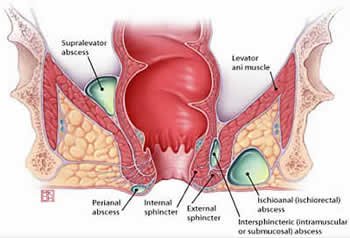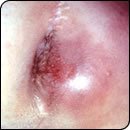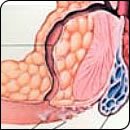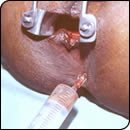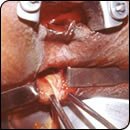Ano – Rectal Abscess
What is Anal Abscess?
A peri-anal abscess manifests due to some infection and results in a collection of pus in the area surroundings the Anus. Peri-anal & Peri-rectal abscesses are categorized depending upon their site of origin. These abscesses, whether big or small, superficial or deep, should be treated immediately to avoid complications like, anal fistula, septicemia etc.
Causes
They may arise secondary to many Ano-rectal ailments like,
- The most important cause of peri anal abscesses is believed to be infection of the anal glands. One or more of these glands may get infected and get filed up with pus. Later it may burst inwards releasing the pus in the surrounding tissue, forming an abscess.
- Tearing of the lining of the anal canal or a peri-anal skin
- Dorsal fissure
- Ruptured Anal heamatoma
- Hemorrhoids
- Pruritus ani – Anal itch
- Trauma with an enema syringe
The deeper Pelvi-rectal abscesses usually develop as a result of:
- Pelvic infection
- Acute appendicitis
- Acute salpingitis ( Infection & swelling of the fallopian tubes)
- Diverticulitis
- Growth in or stricture of sigmoid colon or rectum
- Infection of the Prostate or seminal vesicles.
We also see that some people are more prone to developing anal abscesses. Anal abscesses are more common in men then in females. Diabetes, Chrohn's diseases, Ulcerative colitis, Tuberculosis, Aids are diseases which increase the possibility of a person to develop anal abscess. Persons taking medicines that suppress there immune system are also prone to Ano rectal abscesses.
Symptoms
Signs and symptoms of peri-rectal and peri-anal abscesses include the following:
- Pain : Acute pain of throbbing nature in the anal region is experienced. The pain is aggravating by sitting, coughing, sneezing, and on defecation.
- Discomfort : Patient feels discomfort due to pain and swelling.
- Swelling : A lump like swelling accompanied with tenderness is usually felt in the peri-anal region. Sometimes, the skin over the abscess becomes purple or necrotic.
- Fever : Larger abscesses may be accompanied with fever.
- Fatigue : A specially seen in cases with bigger abscesses
- Pain in abdomen : There is pain and discomfort in the lower abdomen in some cases
- Night Sweating : Occasional
- The swelling/abscess some times bursts allowing the discharge of the pus and spontaneous, temporary relief in the symptoms.
When to see a Doctor?
All Ano rectal abscesses should be treated by medical expert. To rely on self care alone even in the case of a small abscess is not advisable. Neglect may lead to complications like, Fistula in Ano / anal fistula, spread of infection, septicemia etc. Sever pain, inability to pass stool, high grade fever, dizziness, giddiness, persistence vomiting are emergency signs, when the patients should immediately seek medical advice.
Investigations needed
Examinations of the peri-anal region of the patient usually releases a swelling which is the abscess. It may be necessary to perform a per rectum digital examination in some cases. Blood & Urine test can show the extent of systemic effects of the diseases to a cretin extent. X ray, CT scan, MRI, Ultra sound may be helpful in some cases.
Treatment
- Though self care and personal hygiene are of great importance along with professional treatment, this is not a condition which can be treated with self care alone.
- Most experts agree that no amount of anti biotic coverage can correct this condition permanently. Surgery / Operation are nearly always the only solution and the sooner it is performed, the better
- In case of smaller abscesses, minor surgery under local anesthesia followed by a proper antibiotic coverage and pain killer's dose not require hospitalization.
- However when the abscess is bigger or deeper, surgery is performed under general or spinal anesthesia and requires hospitalization.
- The post operative management has to be carried out carefully special in bigger abscesses. The wound is usually left open to drain and heal. It is not stitched up. A package soaked in an antiseptic solution is left in the wound
- It should also be ascertained that there exist no fistulous track.
- t is necessary to establish regular bowel movement with the use of Bulking agents & stool softeners to prevent recurrences. Proctobulk can be used beneficially in this condition.
- A streak regime of personal hygiene is to be maintained. Sit bath in warm water or medicated water Proctobath will not only reduce pain and inflammation but also help in better healing by keeping the wound clean.
Though most peri-rectal and peri-anal abscesses are treated successfully there is some possibility of recurrences.
Ayurveda has a unique approach in preventing recurrences : a medicated setone 'Ksharsutra." Ksharvarti are introduced in to the wound three to five days after surgery for few hours. This helps in the drainage of the infected wound. The herbal medicines coated on the thread dissolve and clear the payogenic membrane / septa in the wound. This is followed by packing the wound with gauze socked in herbal anti septic solution which helps to keep the wound clean and promote quick and efficient healing.
